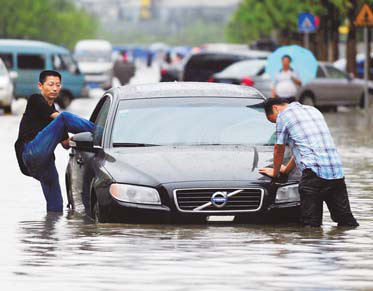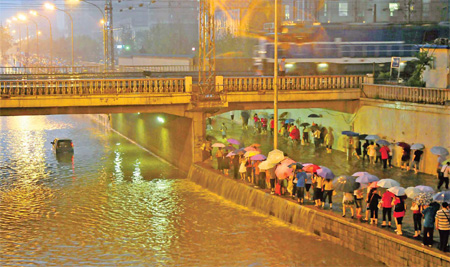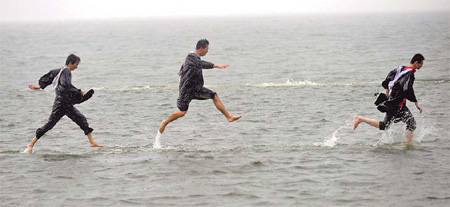Hot on the Web
Deluge brings wave of complaints as cities paralyzed
By Guo Rui in Hubei, Cui Jia and Wang Yan in Beijing (China Daily)
Updated: 2011-06-27 07:54
 |
Large Medium Small |
|
|
People in Beijing do not need a great leap of imagination to forecast chaos after heavy rain in the capital. They've been through this before.
"Last time it rained I was caught in traffic for five hours in the evening rush and was starving. But this time I am prepared," taxi driver Wang Hujun, 46, said as he sat for more than an hour on Thursday behind the wheel of his stationary car at Anhuaqiao flyover on the Third Ring Road.
Wang, a cabbie for more than 10 years, said he stocked his taxi with pot noodles and hot water after he heard the storm was on its way. "Beijing has always been like this when it rains for more than two hours, but the situation is getting worse as more cars and stupid drivers are on the road.
"I am actually quite enjoying the newly added attractions of Beijing, such as 'waterfalls and sea views'," he said. "Next time I will drive a speedboat when the rain comes."
Thursday's rain was the heaviest for a single storm in 10 years, said Wang Yi, spokesman for the Beijing anti-flood headquarters. In some parts of the capital the rain was the heaviest for a century, he said. Shijingshan district recorded the most rainfall, 182 millimeters.
The rushing waters dislodged a manhole cover in Shijingshan, and about 5 pm two men in their 20s were sucked into the drainage system. One fell as he tried to push his stalled car out of the flood; the other fell as he tried to save his colleague.
Both men were migrant workers at a home decoration company. Their bodies were found Saturday.
For most people, however, the storm spewed mere inconvenience and irritation.
Hu Jinjing had just picked up her 11-year-old daughter up from school near Dawang Road near the Central Business District when the rain came down. "I couldn't believe how the water level could rise that fast," she said. She saw the floodwaters trap many cars, but hers was only stuck in the traffic.
Daughter Wu Jie sat quietly in the back seat playing games on an iPad. "I love it when it rains because I can play hours of games and have lots of snacks on the road."
The usual 45-minute ride home took mother and daughter three hours on Thursday. "Beijingers are so used to it now, and I am really not sure that's a good thing or bad thing," Hu said.
"How can Beijing be called an international city if a bit of rain can bring the whole city to a standstill?"
Systems outgrown
|
|
Wang Huizhen, a retired professor at Beijing University of Civil Engineering and an expert on sanitary systems, said a major reason for the city's problem on Thursday was that the storm-drain system lags urbanization.
"The system worked well when it was first designed, but the underground conduits have been used for decades now. From today's point of view, the standards were set at too low a level."
As urbanization speeds up, she said, both the population and building have soared, and concrete- and asphalt-surfaced roads have reduced the percentage of permeable surfaces in urban areas. "In Beijing, the areas under the grade-splitting bridges for road traffic usually suffer the most when heavy rain hits the city," she said.
"Insufficient rainwater collecting is a historical problem, especially in big cities around the country." One solution, she said, would be to gradually upgrade the underground conduits, although that "is not a job done in a day".
She also suggested the city, with its persistent severe water shortage, encourage the collection of water for the city's underground "water bank" through such methods as using permeable bricks and building more low-relief greenbelts.
She was not enamored of the stunning photos of cascades in some subway entrances. Water draining into a subway station "is very dangerous".
Beijing is not standing alone in its urban water problems. Major cities including Wuhan in Hubei province, Nanchang in Jiangxi province and Hangzhou in Zhejiang province have been bothered by abrupt summer rainstorms.
On June 18, Wuhan was hit by the heaviest rain in 12 years, with an average of 196 mm across the provincial capital. Caidian district recorded 203 mm by 5 pm.
The rainfall exceeded the standard drainage capacity of Wuhan, so water stood in most major streets. The water level at 82 crossroads reached 50 millimeters. It exceeded 2 meters on Xinhuaxia Road in Hankou, trapping several people on their way home.
Altogether, 1,200 people were sent to drain the flooded areas. As of 3 pm the next day, 19.48 million cubic meters of water had been drained using firefighters' pumps.
A third significant rainstorm this summer hit Wuhan on Friday, and dozens of crossroads were flooded. The urban drainage system has been blamed for the accumulated water on the street that caused great inconvenience to residents.
Telling waterline
|
|
In this recent round of strong rain, many car owners learned that they don't have to be driving to feel its effects. A 25-year-old woman who lives in Xudong area of Wuhan was stunned when she returned from a June 17-20 business trip.
"The morning after I got home, when I opened the car door, I found the seat was all wet," said the woman, who didn't want her name used. She said she had closed the windows when she had parked the car, but a neighbor told her the water level had reached around 80 cm on June 18 and 19. She wasn't sure how long her car stood in the rainwater, but there was a clear waterline on the car about 55 cm high.
A mechanic checked her car and found that water had penetrated the gearbox, she said, and then told her that repairs would cost 10,000 yuan ($1,544). And she was dissatisfied with the response by her insurance company. "It irritated me greatly." Wuhan's traffic control department said more than 2,000 cars were similarly affected.
Worth the cost?
|
|
Officials of the Drainage Department of Wuhan Water Authority echoed Professor Wang in Beijing on the outdated storm-drain infrastructure. "As an old city, Wuhan built its underground drainage system long time ago," the authority said in a written statement. "As the city continues to develop, the old-fashioned system cannot meet the need of today's urban development."
Yao Zhaohui, director of the urban planning division of Zhejiang Provincial Construction Department, agreed. "The updating of drainage systems is too slow to catch up with the urbanization."
The problem is hard to resolve, said Zhang Beiping,56, a municipal engineering professor with Huazhong University of Science & Technology in Wuhan. A drainage system could be built to handle the heaviest rains, but it would be very expensive and such rains fall rarely.
Zhang said Wuhan's continuing, large-scale construction also aggravated the situation. The flooding at roughly half the intersections that were underwater on June 18 was caused by damaged flow pipes on construction sites of subway stations or the city's Second Ring Road, according to a report from the Wuhan Water Bureau, released on Thursday.
Ye Qing, 49, a National People's Congress deputy from Wuhan, said he visited the drainage system in Paris in the past, and the underground main drains were big enough to drive a car through. The systems in China, including Wuhan's, "are very narrow", Ye said.
He said he understands the high costs of construction, but suggested that areas now under development improve their drainage systems. Climate extremes appear to be appearing more frequently.
Hu Yongqi contributed to this story.
| 分享按钮 |



![Several men try to move a manhole cover to ease the flood in downtown Beijing on Thursday. [Jin Shuo / China News Service] Deluge brings wave of complaints as cities paralyzed](../../images/attachement/jpg/site1/20110627/b8ac6f27aafb0f72127822.jpg)